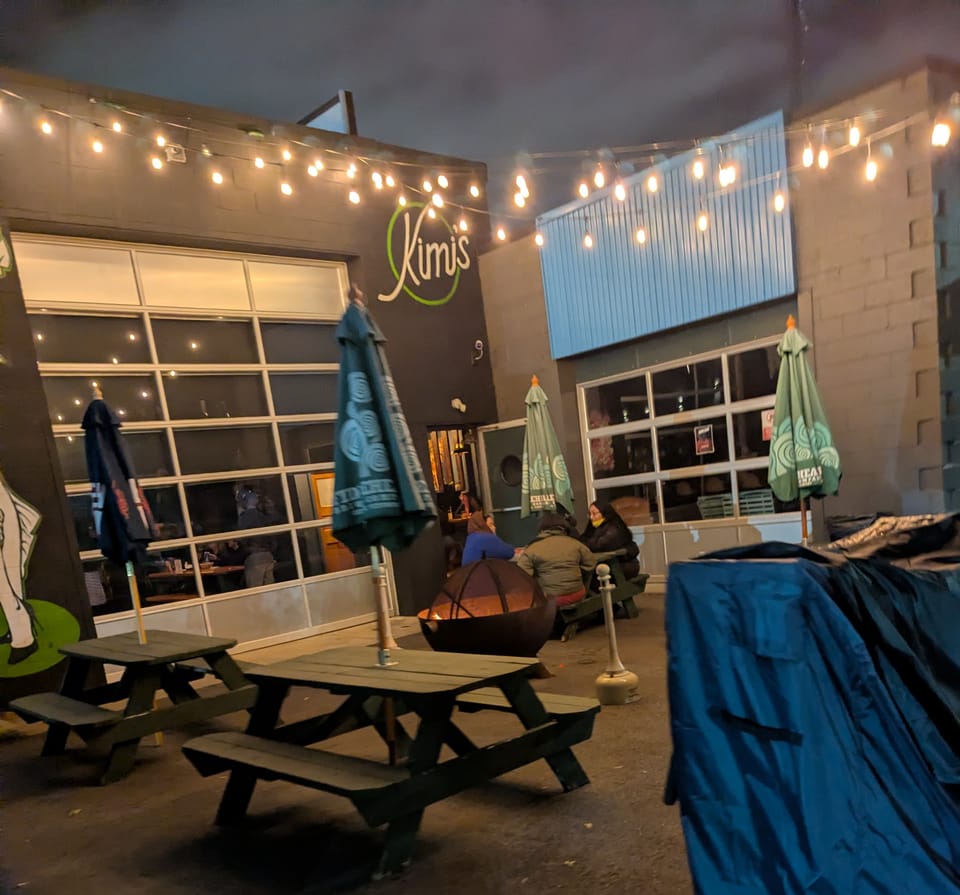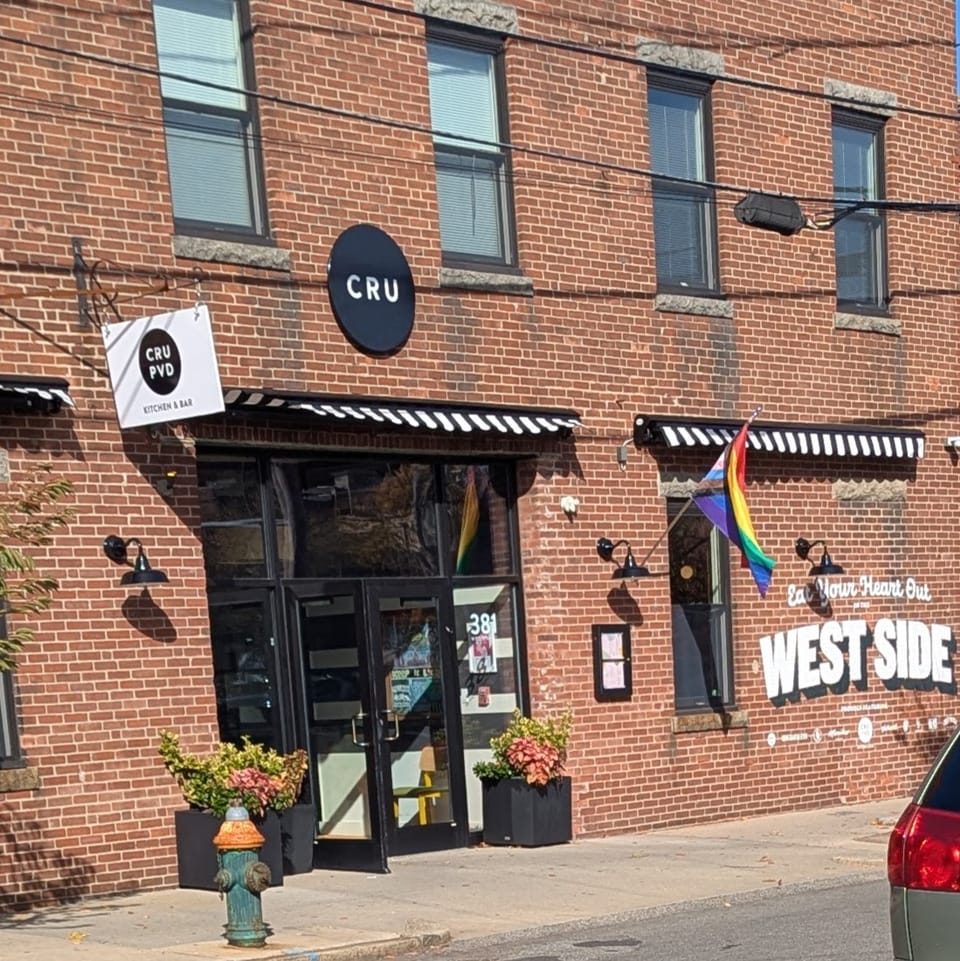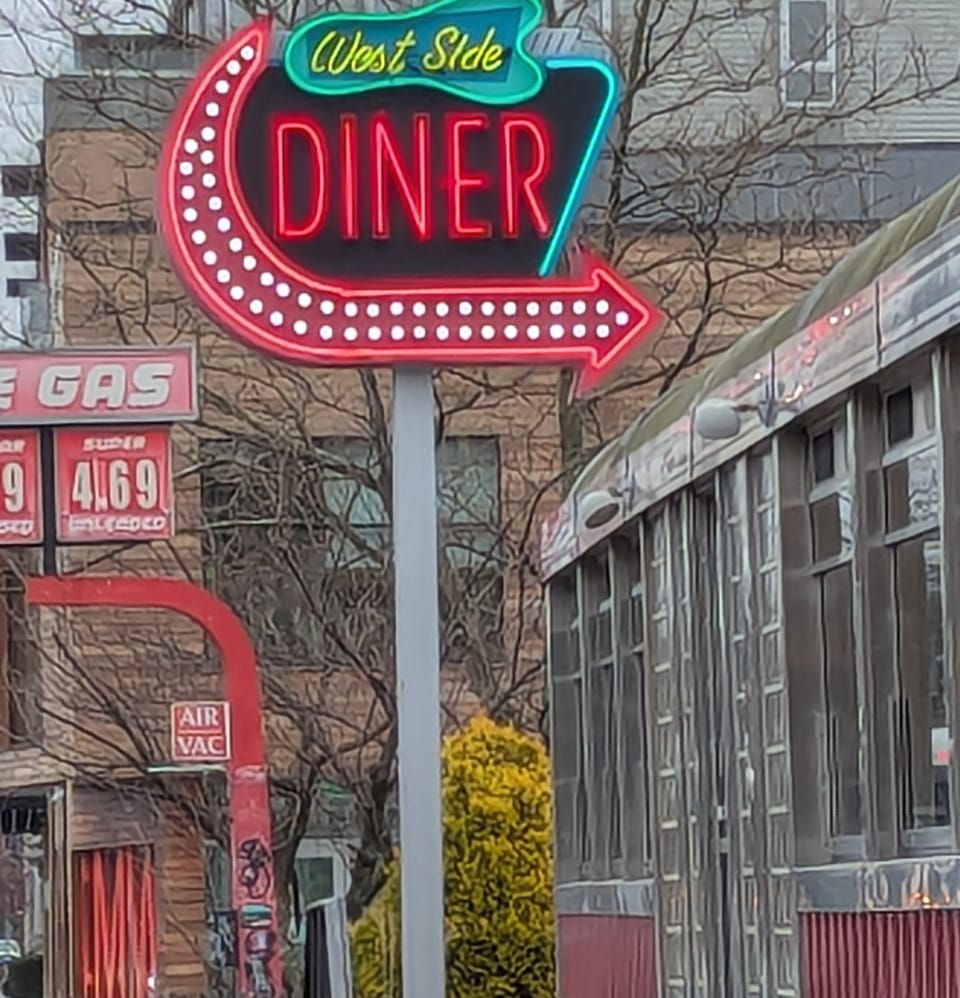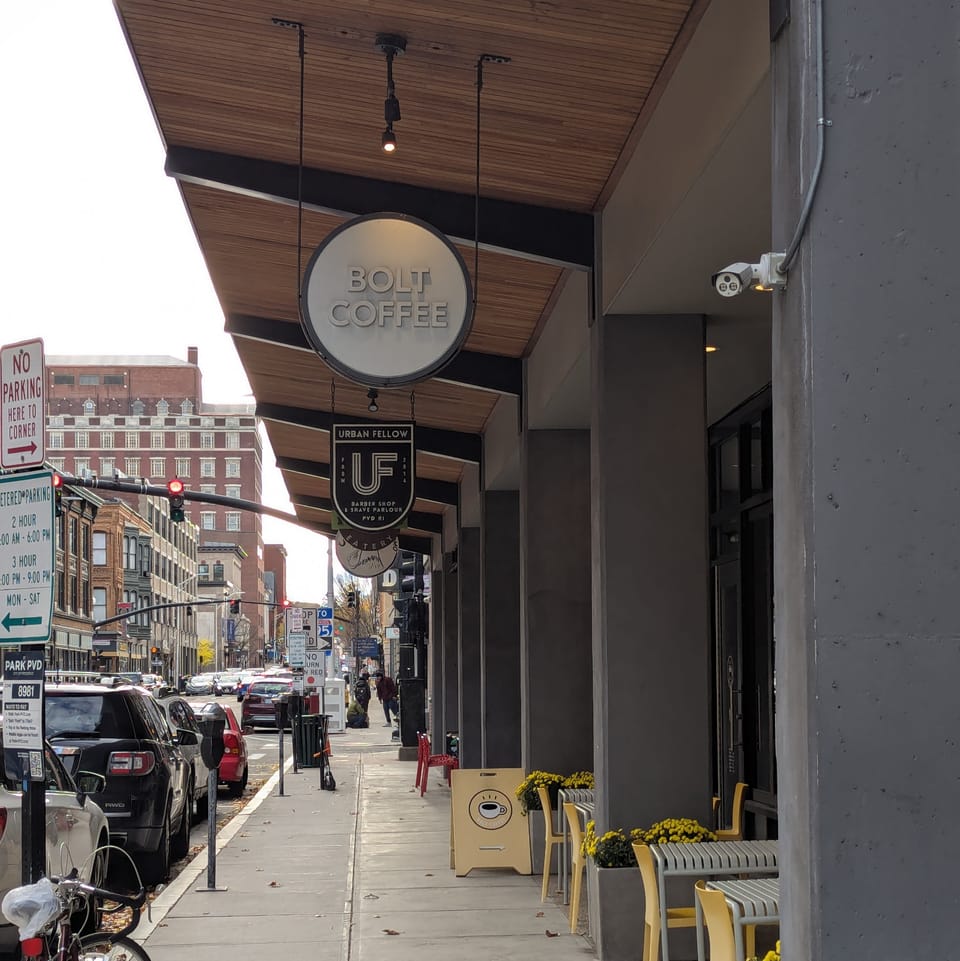001: Sin Bakery
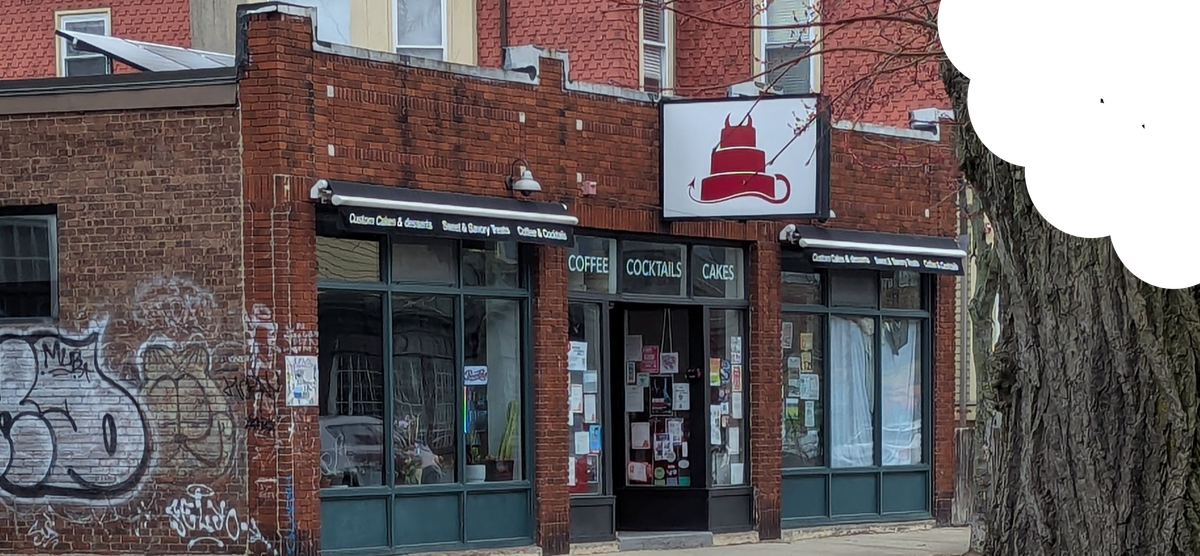
Location: 1413 Westminster St. Hours: Friday, Saturday: 8am to 11:30pm | Sunday, Tuesday, Wednesday, Thursday: 8am to 6pm Date of Visit: February 10, 2024. A Saturday; April 7, 2024. A Sunday.
This is Sin Bakery.
There's no good word in English for what it is, though it serves most closely as a coffee shop, but the more accurate term might be patissier. There is a trend forming in the city that a coffee shop ought to also have a bar in it, a reverse, no doubt, of the days of the early 20th century Italian immigration, where the bars seemed to be required to contain a coffee shop, but as far as you can tell, Sin was one of the first to go the other way. There is a sort of running joke/convention that Providence lacks the sort of civilization that will allow a dedicated coffee shop to stay open past 4:00pm, often brought up to you by people from out of state, people with experience in larger cities, like Boston, Chicago, or New York. Perhaps the bar is a way to justify the late hour opening.
The predominant colors are red and white, and there is that modernist flavor of decor that reminds you of IKEA: bright red plastic chairs that have no sharp edges, tables that are too sharp and whose white veneers are too obvious. All of this overlaid on the white porcelain tile gives it a feel reminiscent of a bright 1950s bakery as designed by an architect with thick glasses and a turtleneck twenty years after that.
The double doors, only one of which opens, are red as well, and you pass these each day with your dog though always from the opposite side of the street. In warmer months, there's often a dog tied up outside, waiting for its owner to get their coffee. At the counter, they sell dog treats a buck fifty a pop, which seems steep for something your dog would devour in seconds. At that price you could get her a dried pig's ear or bully stick, which would at least occupy her for moments and clean her teeth. But you've actually stood in line while someone orders one, so shows what you know. A hastily printed sign on the door informs customers that while dogs are beloved, the local health code prohibits them in shops. You wonder about the intent of that: you recently took your first ever trip to Europe, and animals in shops off all kinds were ubiquitous. In Corfu, cats slept under your chair when you stopped for lunch. And your sister tells you that, in LA, dogs in restaurants are the norm.
They make cakes for events here. That is, you've been led to believe, how the business started, a cake bakery. When you worked for a local nonprofit, Sin made the cake for their tenth anniversary, held in the Providence Public Library's downtown branch (now one of only two branches controlled by the PPL, after they splintered following an ill-advised attempt to consolidate their neighborhood branches). The cake was beautiful, it matched the decor and theme to a T, although of course it was covered in that nearly inedible fondant, so instead the guests for the fundraiser ate cupcakes. But you found the setting to be abhorrent. You were standing in what used to be the main entrance of the PPL, once upon a time a public temple to books, to the written word, met there by the circulation desk, able to go straight on and climb the steps into the stacks, or turn right on your way out and consult with the reference desk, or descend to the microfiche machines. Now the front steps are closed, those massive wooden doors open only for special events that pay a steep rental fee to the contractor who runs the space, and it is segregated out from the library itself. You know times must change, and libraries are not immune to it--if anything, they are more susceptible to it--but you cannot help but feel some revulsion that a space you once came to in order to discover the majesty of literature has been reduced to singing for its supper.
They hold weddings in that space, and as you sit there in Sin at one of the smaller tables along the back wall, you see a couple being guided through a tasting, perhaps by the owner, you don't know, you've never met her directly, but you had the sense she was young and driven then, and this woman is in her late middle age, and then you remember that it's been over a decade since that 10th anniversary event. The bride to be is dressed sharply, casual enough to eat cake but you wouldn't be surprised to find her in an office conference room, leading a meeting. The bridegroom, however, has on a backwards cap and a graphic tee. He's slouching, but if you stayed long enough to see him stand, you might imagine him to be quite tall and broad shouldered. The bride informs the owner (let's call her for now) that they aren't doing coconut, because although she loves it, he does not.
Can you chart a couple's future from five seconds of overheard cake tasting? Probably not, but you do anyway. Divorced within five years, or unhappily married for thirty.
You never made it as far as cake tasting with your ex-fiancee. You celebrated a birthday with her here, once, eating pastries late at night, drinking, talking in the corner just one table over from where this couple is sitting now. You remember the tables being smaller, uncomfortably small. Perhaps they're the ones stationed outside for people who want to eat al fresco now. You don't drink anymore, but the hipster fifteen years out of his era sitting at the bar is drinking what appears to be a peach bellini at 2:00pm in the afternoon while he works on his laptop.
What you are drinking is a mocha latte, which you have decided to pair, for some unfathomable reason, with a pepperoni pizza pretzel. Well, actually, the reason is quite fathomable: you saw it and decided you had to have it. It tickled a memory, like Proust and his madeleine, of your father making English muffin pizzas on nights when your mother wasn't home and it was his week to cook. Something joyful and personal about the size of these things, about how the tomato sauce seems to cook down to the consistency and saltiness of paste, its sugars caramelizing. Why should pizza ever be confined to a pizza dough? The unorthodox improvisation has been rendered by Sin into a commodity that can be sold for less than five dollars. It's worth it, although you wouldn't recommend pairing it with chocolate. The next time you come in, you have a cortado, which is a much better match for the pizza pretzel. And, to be fair, the pretzel, no doubt handmade here in the shop, elevates the pizza far beyond the English muffin, even if, in theory, the two creations are descended from the same lineage.
What separates something from plain fare, the enterprising innovation brought on by a lack of fresh ingredients and a lack of motivation, from haute cuisine? Is it really just substituting a handmade pretzel for an English muffin? No one would have bought your father's pizzas for any amount of money. Of course, this is Rhode Island, where a congealed layer of tart tomato sauce, almost tomato paste, slathered onto a garlic-flavored focaccia and cut into strips is part of the regional cuisine. It was a staple of nearly every child's party you ever attended in elementary school. The last time you remember seeing them, though, they were sitting at Stop and Shop, out at room temperature, each band of strips separated by sheets of wax paper saturated with grease, and you took a picture and sent it to a coworker who was originally from Tennessee and found the whole idea appalling as a way to taunt them.
The man who is arguably your best friend, the one you can easily spend three hours talking via Zoom with each week, visited here with you the last day he stayed at your apartment, coming down from New Hampshire to keep you company after the breakup, playing the board game you Kickstarted to pass the time, that's when you had the cortado, and the two of you each enjoyed a pizza pretzel. And here is where you turned a "friend from knitting" into a friend full stop, after you discovered you were both unemployed, and decided to just hang out at a coffee shop one day. And once she'd made friends with you, suddenly the rest of the knitting group was a lot more willing to engage with you. Not all of them have become friend-friends on her level, but this is the slow, steady work.
There has been more frequent discussion in the media of "third places," the regular hangouts that people can socialize in that's not home or work, where they can develop friendships and enrich their lives absent the pressure of professional or personal relationships. Sin is not one of your third places, you know. But perhaps it's a fourth place, a place where you can deepen the connections you have made at a third place. For a coffee shop that's less than a block from your house, that's pretty good.
This is Sin.
